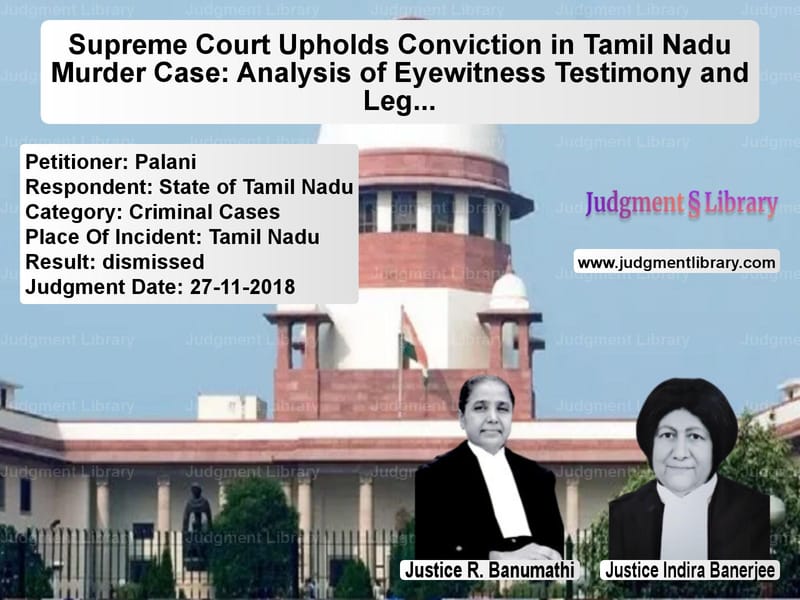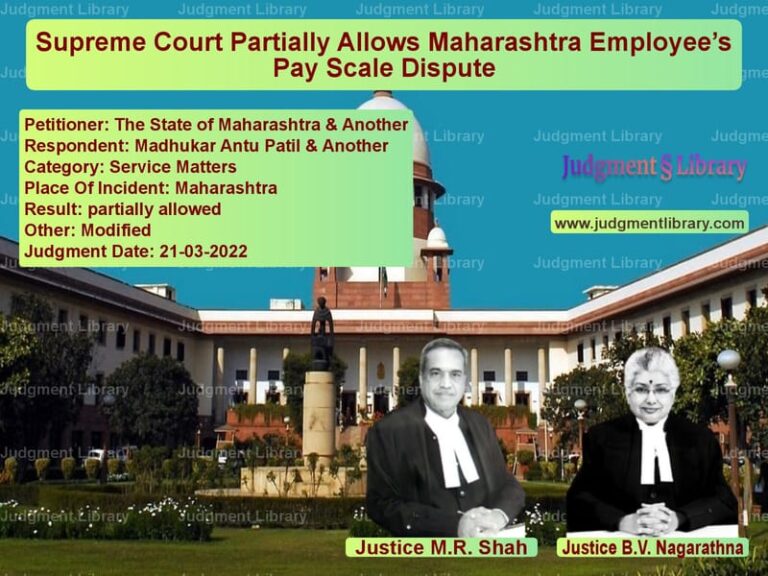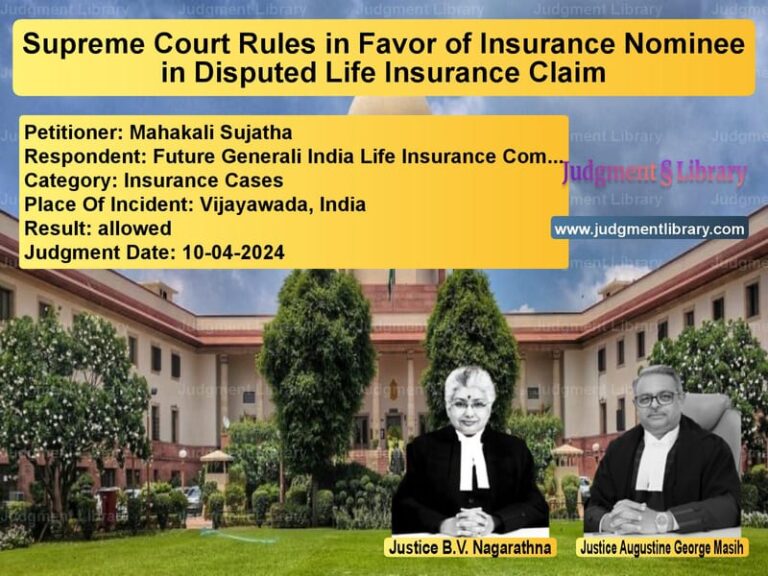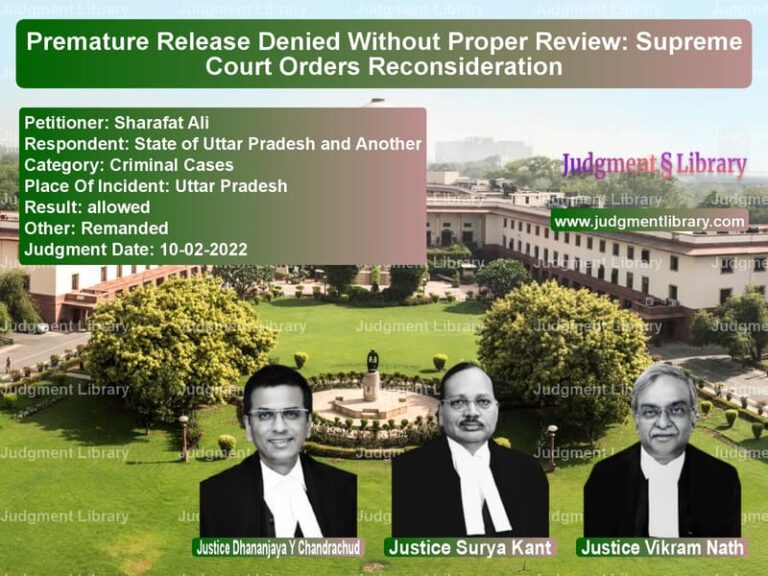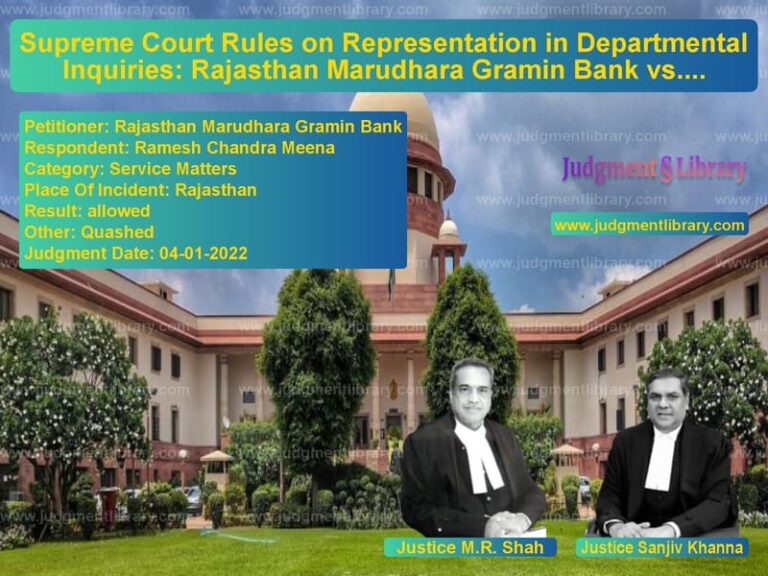Supreme Court Upholds Conviction in Tamil Nadu Murder Case: Analysis of Eyewitness Testimony and Legal Principles
The case of Palani vs. State of Tamil Nadu revolves around a brutal murder that occurred in Tamil Nadu, where multiple accused were convicted under Section 302 IPC (murder) along with related charges. The Supreme Court was tasked with examining whether the conviction was justified based on the evidence presented, particularly the eyewitness testimony of the victim’s mother. The key question before the Court was whether the evidence was reliable enough to sustain a life sentence.
The appeal was filed by Palani, one of the convicted individuals, challenging the decision of the Madras High Court, which had affirmed his conviction and life imprisonment. The case highlights key aspects of criminal jurisprudence, including the role of eyewitness testimony, the impact of procedural delays, and the application of the rule of law in violent crime cases.
Background of the Case
The incident took place on 19th August 1996, at approximately 5:00-5:30 PM, in Harikesavanallur, Tamil Nadu. The deceased, Sankar, along with his uncle Abbas (PW-3), was traveling on a motorcycle when they were ambushed near a temple by a group of eight accused persons. The attack was allegedly instigated by one Jayalakshmi, who exhorted the accused to kill Sankar. The accused, armed with aruvals (bill hooks) and knives, attacked Sankar. After the initial assault, the accused chased Sankar into a paddy field, where he was again attacked, ultimately leading to his death.
The murder was allegedly motivated by a long-standing enmity between the families of the accused and the deceased, particularly related to a failed marriage proposal. The prosecution argued that this long-standing grudge led to a premeditated attack on Sankar.
Arguments by the Appellant (Palani)
- The eyewitness testimony of Kamala (PW-1), the mother of the deceased, was unreliable because she could not have clearly seen the incident from her location in the paddy field.
- The delay of two and a half hours in registering the First Information Report (FIR) and the further delay in submitting it to the Magistrate raised doubts about the authenticity of the case.
- There was an alleged contradiction between the medical evidence and the injuries described by PW-1.
- PWs 2 and 3 did not provide testimony regarding the second phase of the attack in the paddy field, which weakened the prosecution’s case.
- The motive was insufficient to warrant a murder conviction.
Arguments by the Respondent (State of Tamil Nadu)
- The prosecution argued that Kamala (PW-1) was a credible witness and her testimony was supported by medical evidence.
- The delay in filing the FIR was due to the emotional trauma of the victim’s mother, which was natural given the circumstances.
- The medical evidence supported the nature of the attack as described by the eyewitness.
- The testimony of PWs 2 and 3 was consistent with the timeline of the attack.
- The murder was premeditated, and the sequence of events clearly established the guilt of the accused.
Supreme Court’s Judgment
The Supreme Court upheld the conviction and life sentence, ruling that:
- Kamala (PW-1) was a reliable witness, and her testimony was corroborated by medical evidence and other prosecution witnesses.
- The delay in filing the FIR did not affect the credibility of the prosecution’s case, as it was satisfactorily explained.
- “The opinion given by a medical witness need not be the last word on the subject. Such an opinion shall be tested by the court. If the opinion is bereft of logic or objectivity, the court is not obliged to go by that opinion.”
- The court rejected the argument that the eyewitness could not have seen the attack, noting that the injuries were so severe that they were clearly observable.
- The motive, though not the strongest, was sufficient when viewed in the context of the other evidence.
The Court observed:
“The testimony of PW-1 is cogent and consistent and her evidence is amply supported by medical evidence and other evidence. Upon proper appreciation of evidence, the trial court has convicted the appellant for causing the murder of deceased Sankar which was affirmed by the High Court.”
Conclusion
The Supreme Court’s ruling in this case reinforces the principle that credible eyewitness testimony, when corroborated by other evidence, can serve as the foundation for a conviction. The judgment also highlights that procedural delays, while important, do not automatically render a case invalid if they are adequately explained.
The decision serves as a precedent for future cases involving violent crimes, emphasizing the importance of comprehensive evaluation of evidence, including medical reports, witness credibility, and procedural history.
Petitioner Name: Palani.Respondent Name: State of Tamil Nadu.Judgment By: Justice R. Banumathi, Justice Indira Banerjee.Place Of Incident: Tamil Nadu.Judgment Date: 27-11-2018.
Don’t miss out on the full details! Download the complete judgment in PDF format below and gain valuable insights instantly!
Download Judgment: Palani vs State of Tamil Nadu Supreme Court of India Judgment Dated 27-11-2018.pdf
Direct Downlaod Judgment: Direct downlaod this Judgment
See all petitions in Murder Cases
See all petitions in Attempt to Murder Cases
See all petitions in Custodial Deaths and Police Misconduct
See all petitions in Judgment by R. Banumathi
See all petitions in Judgment by Indira Banerjee
See all petitions in dismissed
See all petitions in supreme court of India judgments November 2018
See all petitions in 2018 judgments
See all posts in Criminal Cases Category
See all allowed petitions in Criminal Cases Category
See all Dismissed petitions in Criminal Cases Category
See all partially allowed petitions in Criminal Cases Category

